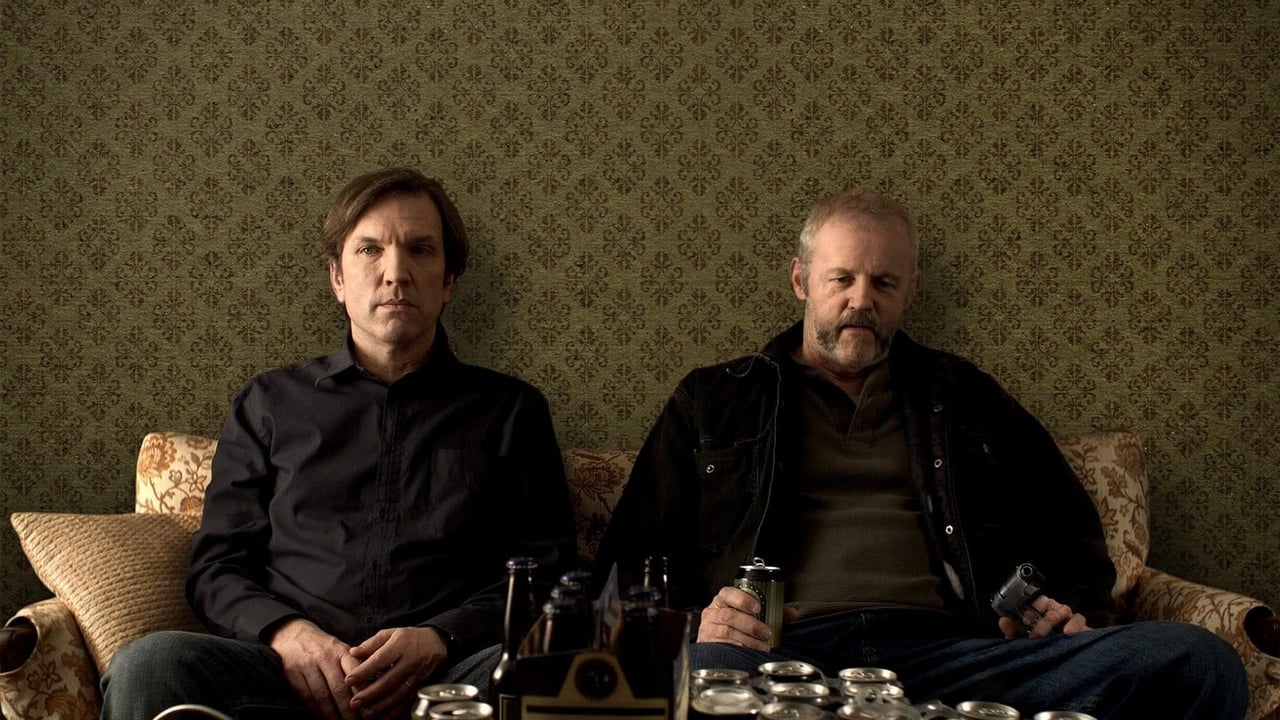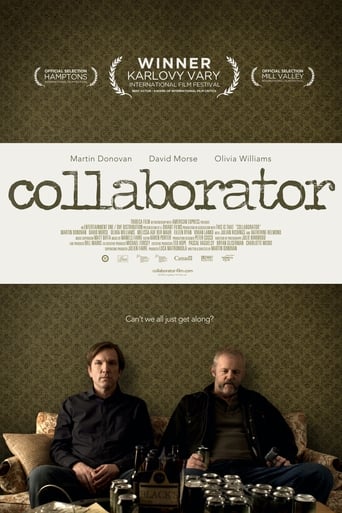

Please don't spend money on this.
... View MoreInstead, you get a movie that's enjoyable enough, but leaves you feeling like it could have been much, much more.
... View Moreit is finally so absorbing because it plays like a lyrical road odyssey that’s also a detective story.
... View MoreThere are moments in this movie where the great movie it could've been peek out... They're fleeting, here, but they're worth savoring, and they happen often enough to make it worth your while.
... View MoreRobert Longfellow (Martin Donovan) is a playwright who is tired of the NY scene. He's not into living in LA either even thought his family is there. He takes a break in his childhood home with his mom. Gus Williams (David Morse) is the lifelong next door neighbor. He's 57, a drunk, in and out of prison, and still lives with his mom.Both of these actors are well seasoned. I was hoping for a lot more. However this feels like a writing exercise from writer/director Martin Donovan. This does improve when the actors are in the house together. The energy and the tension picks up a bit. I wish there was less time spent on the introduction. It's not really necessary. This movie works best as a 2-man play.
... View MoreI get the feeling I liked this more than I really ought to have done. Nevertheless I did like it.There was something really pleasing about the lazy tempo, the acting, the sound, and the way it was shot. Even down to the styling of locations and furniture. That shouldn't matter so much but it makes a big difference in *certain* kinds of film for me and this was one. It helps set a mood, whether it's a pretentious office, an affluent LA home, or a parent's suburban home. So I think it's an oft overlooked skill which is done well here.OK so there's no clever plot twists or gimmicks going on here - it really is a very simple tale, but the magic's all in the telling.There is an element of suspense in wondering why they are even in the situation they are in, and how it will end for them. The real juice here is the dialogue and interaction between Morse and Donovan's characters, and lesser so between Donovan and Williams' characters.You feel Donovan's awkward avoidance of Morse transform into over-compensated forced dialogue. You can tell there's something festering under the surface but you're never sure exactly what that is. It's almost like Morse sensed the phony avoidance and when things go South for him, he decides to make some mischief with Donovan on his way out. So you're wrestling with this kind of are they/aren't they on good terms question throughout.Morse's phone call to Williams' actress was very touching - like the last privilege of a condemned man.And then there's an incident which introduces more tension and uncertainty into the dynamic towards the end.I appreciated the different approach to the hunted man character here - throwing caution to the wind and getting wasted. A refreshing change from manic rage or desperation. I think that made it more interesting. No clever chess game of negotiation either.Most of the film felt like watching a play which may have been intentional irony, given Donovan's character's playwright occupation.I had a feeling this movie could be good despite the reviews but still, it was better than I expected. Definitely worth a watch at any rate.All of the acting was good here, but Morse was the best - what a shame he hasn't got more character work in movies. What a waste.
... View MoreThere are two problems that prevented "Collaborator" from being the thought-provoking character study it so clearly wanted to be. Firstly, writer/director/star Martin Donovan could not come to a decision as to what he wanted it to be about; it plays like a shopping list of concepts that he picked at random and only examined at arm's length, never once allowing them to develop into anything or even to let them be resolved. Secondly, the concepts are so manufactured, so innately cinematic, that they could never engage the viewer at any level beyond those of technique and performance. Logically and emotionally, there's nothing much to grab on to. I'm sure that Donovan found them all interesting, but they have to be of interest to the audience if they're to actually work. In order for us to find them interesting, we have to be told what we should be paying attention to.Donovan has cast himself as Robert Longfellow, a New York playwright whose works of late have been critical disasters and whose latest effort closed after only two weeks on Broadway. He hasn't seen much of his wife, Alice (Melissa Auf der Maur), or his two children, and phone conversations between husband and wife are obviously strained. In due time, he finds himself in his hometown of Los Angeles. In part, it's to find some writing work; he has already been given an offer to polish a screenplay for what I think was supposed to be a teen slasher film. Mostly, however, it's to reunite with his old flame, a British actress named Emma Stiles (Olivia Williams), who got her start in Longfellow's plays in New York. Quite obviously, there's unfinished business between them.To top everything off, he's visiting his mother, Irene (Katherine Helmond), who he feels shouldn't be living alone anymore. Perhaps she is up in years and slower to keep up, but it never once seemed as if she was ailing. So then why does Longfellow seem so worried about her? It could, perhaps, stem from guilt and anger; for both of them, the elephant in the room is Longfellow's brother, who joined the military and ultimately died serving in Vietnam. Longfellow, like many progressives and artists of his generation, vehemently opposed the war and believed all the soldiers' deaths, including his brother's, were in vain. Irene's politics are not made known, but it's obvious that she has emotionally kept herself at somewhat of a distance. Neither of them appears to feel very much.Quite unexpectedly, Longfellow is reunited with his childhood friend, Gus Williams (David Morse), who, at age fifty-seven, still lives across the street with his mother (Eileen Ryan), who does little more than exist. An ex-con with a police record we suspect is long and extensive, Williams comes back into Longfellow's life as a sad, gruff, foulmouthed loser perpetually numb on beer and pot, the former of which is never in short supply. One night, when Longfellow was supposed to meet with Emma – and you should know, this comes after spending the day at her home and kissing her – Williams pulls out a gun and takes Longfellow hostage as squads of police cars and news vans begin clogging the street. We don't yet know what Williams did, but he's making it abundantly clear that he doesn't want to go back to jail.What follows is a well-intentioned but unsuccessful attempt at delving deeper into the minds of these men. In an effort to ease the situation, Longfellow arranges to have Williams talk with Emma, his favorite actress, over a cell phone. It doesn't work too well because the SWAT team keeps attempting to negotiate with Williams via the landline. Longfellow gets back in touch with Alice and tries his best to ease her mind, unaware that the media has somehow obtained a video of him and Emma kissing. Between these moments, the two have unconvincing and rather inappropriate conversations about the writing process, all of which eventually turn into narratively pretentious improv sessions. And then they inevitably get into a huge fight over politics, the conservative Williams having a very different opinion of the American military.On the basis of this description, you'd think "Collaborator" was a rich, thematically complex film. It isn't. None of the ideas mentioned above are allowed to come to fruition. They're introduced, and then left to go stale. Of course, it's not as if developing them fully would have helped matters much. That's because every idea presented in this film is little more than a contrivance. Here is a screenplay that could not have evolved organically; it comes off more like a writing assignment, one in which Donovan was instructed to gather familiar scenarios and then find a way to string them together. This wouldn't have been a problem had he managed to resolve any of them satisfactorily. The end is a disappointment, not just because of the emotional loose ends that weren't tied up but also because of a rather showy and ill-fitting blurring of fantasy and reality.-- Chris Pandolfi (www.atatheaternearyou.net)
... View MoreI had the opportunity to see Collaborator at the Newport Beach International Film Festival and the New York City premiere. It's a thrilling movie that takes the viewer on a roller-coaster ride of unexpected turns. From politics, to fidelity, to war, to crime and seeing the explosive interaction between two very opposite individuals there is surely to be some portion of Collaborator which makes you laugh, become angry, and feel empathy towards the characters. A well thought out and executed film with a highly climactic ending that I enjoyed immensely. David Morse's character is executed very well and by the end of the film, I couldn't help but to feel quite sad for the life which he's led. If you have the opportunity, I'd highly recommend it.
... View More